 Petzlover
Petzlover Chinook is originated from United States but Kanni is originated from India. Both Chinook and Kanni are having almost same height. Chinook may weigh 19 kg / 42 pounds more than Kanni. Both Chinook and Kanni has almost same life span. Both Chinook and Kanni has almost same litter size. Chinook requires High Maintenance. But Kanni requires Low Maintenance
Chinook is originated from United States but Kanni is originated from India. Both Chinook and Kanni are having almost same height. Chinook may weigh 19 kg / 42 pounds more than Kanni. Both Chinook and Kanni has almost same life span. Both Chinook and Kanni has almost same litter size. Chinook requires High Maintenance. But Kanni requires Low Maintenance
 In the early 20th century, in the small town of Wonalancet, New Hampshire a new breed of dog called the Chinook was born. Developed by Arthur Treadwell Walden, the breed is named after the first male ancestor who was named Chinook. The breed is a rare sled dog and the official dog of the state of New Hampshire. The Chinook was born of a cross between a large Mastiff-like street dog and huskies that were part of the Peary North Pole expedition.
In the early 20th century, in the small town of Wonalancet, New Hampshire a new breed of dog called the Chinook was born. Developed by Arthur Treadwell Walden, the breed is named after the first male ancestor who was named Chinook. The breed is a rare sled dog and the official dog of the state of New Hampshire. The Chinook was born of a cross between a large Mastiff-like street dog and huskies that were part of the Peary North Pole expedition.
Walden was an experienced slender and looking for a dog that was stronger, faster and had more stamina than his current sled dogs. Walden had years of experience including being the trainer and lead on Byrd’s 1929 Antarctic expedition and plenty of Yukon experience. Once he had the male Chinook he bred him with German Shepherds, Belgian Sheepdogs and Canadian Eskimo Dogs at the very least. He then bred those puppies back to Chinook until he had the type and traits he wanted. Following Walden, Julia Lombard and then Perry Greene took over mastery of the breed. From the 1940’s until he died in 1963, Greene was the only person who was breeding Chinooks. So, there were few left after his death. The breed neared extinction by 1981 with only 11 Chinooks available to breed. These dogs were divided between three breeders who saved the breed from becoming extinct.
In 1991, the United Kingdom recognized the Chinook and they were also registered with the UKC. At that time there were about 800 dogs in the breed. To increase the breed, there was a cross-breeding program that took Chinooks and bred them back to the breeds they considered to be apart of the original Chinook lineage. These 4th generation dogs might meet the standards of the Chinook Owners Associations Cross Breeding Program and be accepted as purebred.
In 2001 the Chinook was entered into the AKC Foundation Stock Service and added to the Miscellaneous class of the AKC in 2010. In January of 20113, the Chinook was finally granted full recognition and breed status within the AKC in the working group. He is a large working dog, rugged, patience, loyal and intelligent. He is one of the rarest breeds in the AKC.
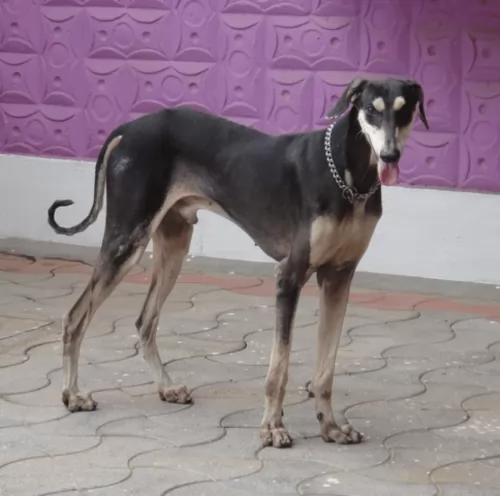 The Kanni dog is a rare South Indian Sighthound. It is also known as the Maiden's Beastmaster and this is because it is known to be protector and defender of its owner's property.
The Kanni dog is a rare South Indian Sighthound. It is also known as the Maiden's Beastmaster and this is because it is known to be protector and defender of its owner's property.
During ancient times, the dog was used for hunting but today it is essentially kept as a pet and it is registered with the Kennel Club of India.
 The Chinook is a muscular dog, making him a perfect fit to be a sled dog or a hauler of any type. He has a deep chest and powerful muzzle with enduring teeth. The ears can be pricked up or bent and wind-blown. The nostrils of the Chinook are solid black and wide, while the lips are black, the eyes look like almonds and are dark with intelligence in their glance. The feet are firm and oval, the pads cushioned and with dark pigmentation. The tail should not be docked.
The Chinook is a muscular dog, making him a perfect fit to be a sled dog or a hauler of any type. He has a deep chest and powerful muzzle with enduring teeth. The ears can be pricked up or bent and wind-blown. The nostrils of the Chinook are solid black and wide, while the lips are black, the eyes look like almonds and are dark with intelligence in their glance. The feet are firm and oval, the pads cushioned and with dark pigmentation. The tail should not be docked.
The breed has a double coat and hair of medium length The undercoat is soft and thick while the outercoat is close to the body and coarse. The Chinook is usually a tawny, reddish color.
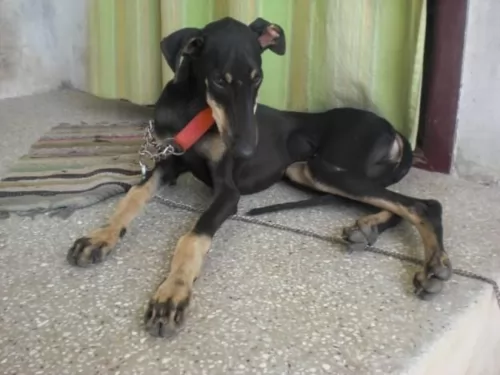 These dogs are tall, slim and deep chested, coming in two-color combinations, but it is the black and tan variety that is the true Kanni. There is also a cream variety. There are other color variations and each color has a unique name connected to it. The coat of the Kanni is short and smooth.
These dogs are tall, slim and deep chested, coming in two-color combinations, but it is the black and tan variety that is the true Kanni. There is also a cream variety. There are other color variations and each color has a unique name connected to it. The coat of the Kanni is short and smooth.
They are medium sized dogs standing at 62 to 67cm at the withers and weighing in the region of 18 – 22kg. When you first look at these dogs you might think of them as being similar to a Greyhound in looks. This is also because of their lean, muscular looks.
The eyes are a golden color, the nose black and the ears are a medium size and floppy with the long tail being semi-curved.
The Kanni has always been a hunting dog so he is used to being sharp, strong-willed, independent and alert as well as having some aggressive tendencies. It is also quite a reserved dog but he shows love and loyalty to his owner. He is independent and easy to train. It is a good thing to have him trained and socialized so that he is obedient to the simple commands you give him.
 This is a playful, affectionate and loyal breed. They have a special love for kids and always want to learn and please you. They are intelligent and very trainable. The Chinook is good with other dogs and as a sled dog they love to work in packs. They can be reserved but they are never aggressive or shy.
This is a playful, affectionate and loyal breed. They have a special love for kids and always want to learn and please you. They are intelligent and very trainable. The Chinook is good with other dogs and as a sled dog they love to work in packs. They can be reserved but they are never aggressive or shy.
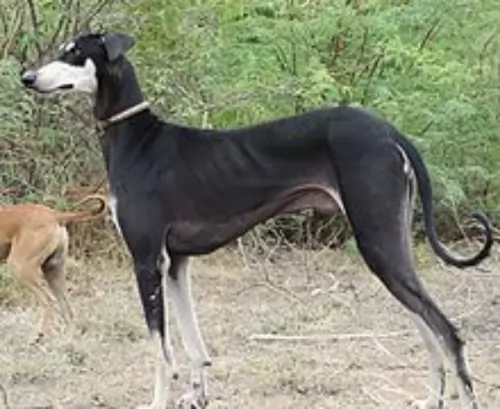 The Kanni looks much like your regular Doberman Pinscher but he has long tail and floppy ears. He is slim and agile but also powerful being able to have bursts of speed. It is why he requires a large place to run and play in, being better suited to a home with a large garden or farm.
The Kanni looks much like your regular Doberman Pinscher but he has long tail and floppy ears. He is slim and agile but also powerful being able to have bursts of speed. It is why he requires a large place to run and play in, being better suited to a home with a large garden or farm.
He is a playful, quiet dog but he has quite a bark on him and is known to be a good watchdog because of this. He is a protective dog too, devoted and loyal and making a splendid family pet.
 For the most part, the Chinook is a healthy dog. There are however some issues they do have to contend with including:
For the most part, the Chinook is a healthy dog. There are however some issues they do have to contend with including:
Sometimes know as Chinook seizures this is really a movement disorder and perhaps not a true epilepsy.
This dermatitis may be hereditary. It causes itchy skin and is actual an immune system issue.
Chinook are known for a variety of gastrointestinal disorders manifested by diarrhea and vomiting.
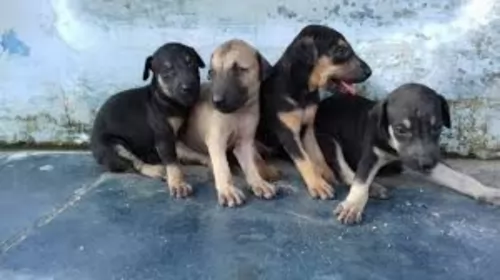 Not much is known about inherited health problems in this breed, and he can live up to a ripe old age of 16. It seems a pretty healthy dog, but still it helps to be aware of some of the more common dog illnesses that your pet can succumb to.
Not much is known about inherited health problems in this breed, and he can live up to a ripe old age of 16. It seems a pretty healthy dog, but still it helps to be aware of some of the more common dog illnesses that your pet can succumb to.
For first time dog owners it can be difficult knowing what health problems our beloved pets could suffer from. Every dog breed has certain diseases to which they are more prone to, but these are some common issues that most of our 4-legged friends will face -
This is a common dog health problem in India with the Kanni. There are so many things that disagree with their digestion. Most dogs may not want to eat their next meal, but when he is lethargic, he is hot and is vomiting, it is time to get your pet to the vet. This is because diarrhea causes rapid dehydration in dogs. To avoid diarrhea, steer clear of certain foods such as milk and dairy products as well as old, spoiled fatty foods. With diarrhea your dog must always have access to fresh, cool water.
This is a common dog disease, and ear infections can be painful and frustrating for your pet. He’ll scratch at his ear, shake his head and the inside of the ear may be red with a discharge. Check his ears for redness and try to keep them free from wax build up and dust.
Cleaning the ear is quite simple, and if you’re not sure how, the vet can do it quickly and effectively. Usually some dog ear cleaning solution on some cotton wool can do the trick. Ear infections are common in dogs like the Kanni with floppy ears.
It is essential to control fleas on your dog from word go. Fleas thrive in warm temperature and humidity and your pet will scratch, bite and lick at the spot. When you brush your pet, look through his fur for fleas and tell you vet about it if you discover ticks and fleas. A topical ointment could nip the problem in the bud. You may want to consider a flea collar for your pet.
Tapeworms, hookworms and roundworms for instance are commonly found in dogs, and even for healthy dogs, deworming tablets should be given from time to time. If your dog has worms, you’ll notice lethargy, loss of appetite, diarrhea and vomiting. It may be time to get your pet to the vet.
 Don’t overfeed your dog. Based on how hard he is working for you feed twice a day. Dividing 3 to 5 cups into two meals.
Don’t overfeed your dog. Based on how hard he is working for you feed twice a day. Dividing 3 to 5 cups into two meals.
Although the Chinook is still active in recreational sledding, he is mostly a family pet these days. Given this the Chinook need a good deal of exercise and competition. They are great at search and rescue, dog packing, agility, obedience, herding, carting and skijoring. They need some form of solid exercise for 30 to 60 minutes every day.
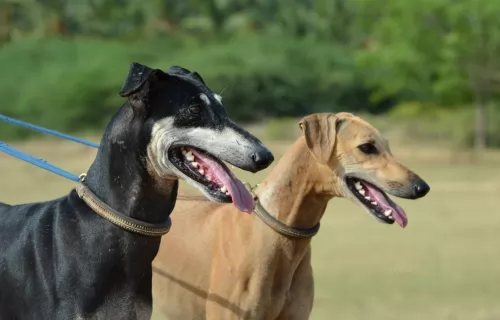 The Kanni is a low maintenance dog with his short coat. You can give him a good brush twice a week, check that his nails don't grow too long and also check his ears inside and out. Ticks and fleas are rife in hot weather and you want to give your dog a thorough check for these. You should also be checking your dog's teeth and brushing them 2 or 3 times a week. Dental problems can cause havoc with your dog's health.
The Kanni is a low maintenance dog with his short coat. You can give him a good brush twice a week, check that his nails don't grow too long and also check his ears inside and out. Ticks and fleas are rife in hot weather and you want to give your dog a thorough check for these. You should also be checking your dog's teeth and brushing them 2 or 3 times a week. Dental problems can cause havoc with your dog's health.
As a hunting breed, the Kanni is used to running so his needs for a good amount of exercise are quite high. While they do make good family pets, they hanker after wide open spaces and being busy. If you own one of these dogs, make sure that you exercise him often because otherwise he becomes frustrated and unhappy.
This dog has always been used to village life where he is free to roam wide open spaces. He is much more suited to country life than to city life, and as a pet, you will need to ensure that he receives a good amount of exercise.
Take him for walks, and if he's been socialized and trained, take him to the park and allow him off his leash to run.
The dog has always been fed traditional food such as porridge and milk but we know better now that dogs need protein too as well as a diet rich in vitamins and minerals to ensure his health.
You can feed him a top quality commercially manufactured dog food and add in some cooked chicken, rice and vegetables from time to time. It is expensive, but if you can, try and add in some raw meat occasionally as well. Your Kanni dog must always have access to fresh, clean water.